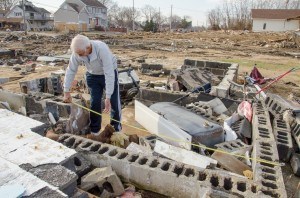Insurance regulators in New Jersey and New York—the two states hardest-hit by Sandy—report that insurers have settled 93 percent of the claims they received in the wake of superstorm Sandy, according to the Insurance Information Institute (I.I.I.).

More than half of the 1.5 million claims for Sandy-related damage to homes, vehicles, boats and businesses were filed in either New Jersey or New York. The others were filed in a dozen other states as well as the District of Columbia.
The I.I.I. said that insurance companies will pay an estimated $18.8 billion in claims to their policyholders, making Sandy the third costliest storm in U.S. history, as defined by insurance claims payouts. Hurricane Katrina in 2005 ($48.7 billion) and Hurricane Andrew in 1992 ($25.6 billion) were larger insurance events. Both of those claims payout numbers are expressed in 2012 dollars; moreover, Katrina and Andrew were hurricanes when they made landfall whereas Sandy was a post-tropical cyclone.
“The billions of dollars that private insurers paid to home, business and vehicle owners have helped to stabilize the economies of states hard hit by Sandy. Those same dollars also helped to spur growth and create more resilient communities for the future,” said Dr. Robert Hartwig, president of the Insurance Information Institute and an economist.
The estimates of claims payments do not include claims for flood damage insured under the federal government’s National Flood Insurance Program (NFIP).
The damage caused by Sandy generated nearly 1.1 million claims from homeowners, a quarter million from vehicle owners and more than 200,000 claims from business owners. Business claims accounted for only 13 percent of all those filed after Sandy yet they will in the end account for 48 percent of all the Sandy claim dollars paid, an I.I.I. analysis determined. The reason is that the value of commercial property is often higher than that of home properties and thus the cost to repair or rebuild is greater. In addition, business interruption coverage reimburses a business owner for lost profits and continuing fixed expenses during the time that a business must stay closed because of physical damage to their premises.
New York and New Jersey also had the largest Sandy-caused flood damages. Flood insurance is usually not covered under a standard homeowners or business owners policy but is available through the federal government’s National Flood Insurance Program. The percentage of homes and businesses situated on the Atlantic Seaboard, with flood insurance policies prior to Sandy, was comparatively low as compared to other hurricane-prone states, such as Louisiana and Florida.
Flood damage to vehicles is typically covered under the optional comprehensive portion of standard auto insurance policies.
Sandy made landfall near Atlantic City, New Jersey, on October 29, 2012, causing fatalities and widespread power outages in addition to significant property damage. Sandy insurance claims were also filed in Connecticut, Delaware, Massachusetts, Maine, New Hampshire, North Carolina, Ohio, Pennsylvania, Rhode Island, Vermont, Virginia and West Virginia.
Source: I.I.I.
Was this article valuable?
Here are more articles you may enjoy.

 UBS Top Executives to Appear at Senate Hearing on Credit Suisse Nazi Accounts
UBS Top Executives to Appear at Senate Hearing on Credit Suisse Nazi Accounts  One out of 10 Cars Sold in Europe Is Now Made by a Chinese Brand
One out of 10 Cars Sold in Europe Is Now Made by a Chinese Brand  LA County Told to Pause $4B in Abuse Payouts as DA Probes Fraud Claims
LA County Told to Pause $4B in Abuse Payouts as DA Probes Fraud Claims  Charges Dropped Against ‘Poster Boy’ Contractor Accused of Insurance Fraud
Charges Dropped Against ‘Poster Boy’ Contractor Accused of Insurance Fraud 